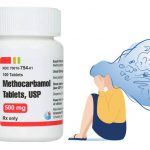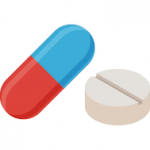How Effective Is Amitriptyline for Anxiety?

According to the American Psychological Association (APA), anxiety is an emotion characterized by feelings of tension, worried thoughts, and physical changes like increased blood pressure. Knowing the difference between normal feelings of anxiety and an anxiety disorder requiring medical attention can help a person identify and treat the condition.
The duration or severity of an anxious feeling can sometimes be out of proportion to the original trigger, or stressor. Physical symptoms, such as increased blood pressure and nausea, may also develop. These responses move beyond anxiety into an anxiety disorder.
The APA describes a person with anxiety disorder as “having recurring intrusive thoughts or concerns.” Once anxiety reaches the stage of a disorder, it can interfere with daily function.
While a number of different diagnoses constitute anxiety disorders, the symptoms of a generalized anxiety disorder (GAD) will often include the following:
• restlessness, and a feeling of being “on-edge”
• uncontrollable feelings of worry
• increased irritability
• concentration difficulties
• sleep difficulties, such as problems in falling or staying asleep
While these symptoms might be normal to experience in daily life, people with GAD will experience them to persistent or extreme levels. GAD may present as vague, unsettling worry or more severe anxiety that disrupts day-to-day living.
What is amitriptyline?
Amitriptyline is a tricyclic antidepressant with sedative effects. Amitriptyline affects certain chemical messengers (neurotransmitters) that communicate between brain cells and help regulate mood. Amitriptyline is a prescription medicine used to treat symptoms of depression.
Although amitriptyline is FDA approved to treat depression in adults, it is also used off label to treat conditions like anxiety, post-traumatic stress disorder, insomnia, chronic pain (diabetic neuropathy, fibromyalgia), irritable bowel syndrome, interstitial cystitis (bladder pain syndrome), migraine prophylaxis, postherpetic neuralgia, and sialorrhea.
Off-label means that a drug hasn’t gone through the stringent and lengthy process required for FDA (Food and Drug Administration) approval for that use. Healthcare providers may, at their discretion, prescribe medications for conditions other than those the FDA has explicitly approved them for. Anything outside of the original FDA approval is considered off-label. Typically, the FDA approves a new drug for specific use in a specific group, basically offering their seal of approval that the drug is safe and effective.
How it works
Amitriptyline belongs to a class of drugs called tricyclic antidepressants. A class of drugs is a group of medications that work in a similar way. These drugs are often used to treat similar conditions. Amitriptyline works on your central nervous system to increase the level of certain chemicals in your brain, which improves your depression.
Is amitriptyline good for anxiety?
It’s not clear exactly how amitriptyline works for anxiety, but the medication has been shown to be helpful in some people battling anxiety. However, amitriptyline may cause some people to be agitated, irritable, or display other abnormal behaviors. It may also cause some people to have suicidal thoughts and tendencies or to become more depressed.
Studies indicate that selective serotonin reuptake inhibitors (SSRIs) like fluoxetine were comparably efficacious to amitriptyline in the treatment of major depression with associated anxiety.
Why is amitriptyline no longer prescribed?
In 2000, Elavil a brand of amitriptyline was discontinued by the Food and Drug Administration (FDA) due to the severe side effects people experienced while using the medication. The more common side effects of amitriptyline can include:
• confusion
• numbness and tingling in your arms and legs
• headache
• constipation or diarrhea
• blurred vision
• skin rash
• swelling of your face and tongue
• nausea
• unexpected weight gain or loss
• dizziness
• dry mouth
If these effects are mild, they may go away within a few days or a couple of weeks. If they’re more severe or don’t go away, talk with your doctor or pharmacist.
Serious side effects
Call your doctor right away if you have serious side effects. Call 911 if your symptoms feel life-threatening or if you think you’re having a medical emergency. Serious side effects and their symptoms can include the following:
• Heart attack. Symptoms can include:
o chest pain
o shortness of breath
o pain or pressure in your chest or upper body
• Stroke. Symptoms can include:
o weakness in one part or side of your body
o slurred speech
• Seizures
• Withdrawal (if you suddenly stop taking this drug). Symptoms can include:
o headache
o nausea
o trouble sleeping
o depression
o mood swings
• Increases or decreases in blood sugar
• Suicidal thoughts or actions
• Orthostatic hypotension (sudden drop in blood pressure when standing)





